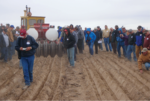Advertise Follow Us
Articles Tagged with ''conservation''
What I've Learned from No-Tilling
It Isn’t Just Not Tilling: It’s The System
No-till innovator turned no-till advocate, researcher and farmer Don Lobb helped launch a conservation revolution north of the U.S. border and beyond.
Read More
New Concepts For Deep-Furrow Drills May Boost Dryland Conservation
Research in the Pacific Northwest finds new packer wheels, coulters, spider wheels and wider row spacings could help wheat farmers embrace conservation tillage without sacrificing yields.
Read More








